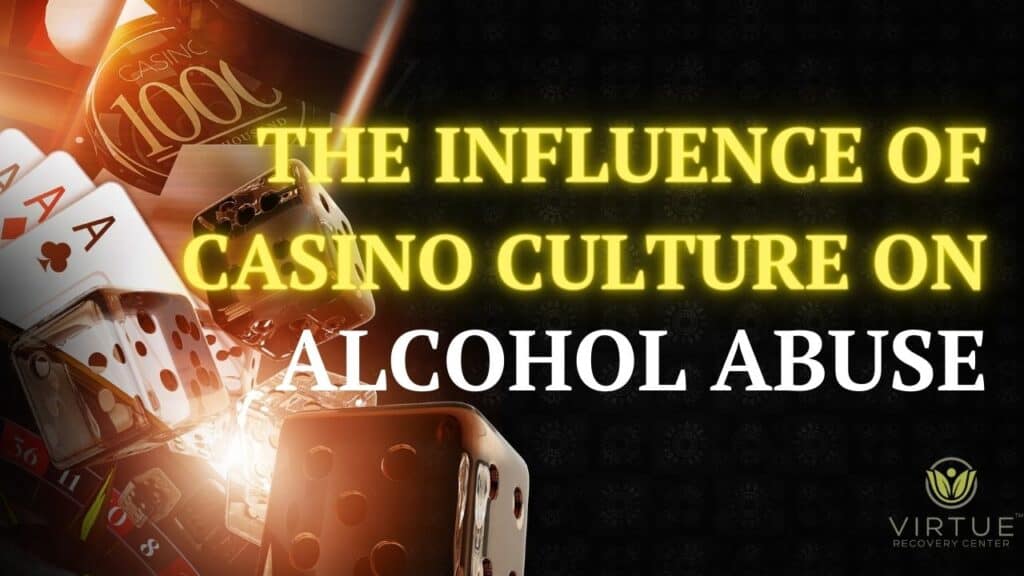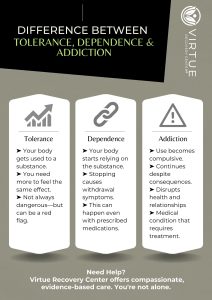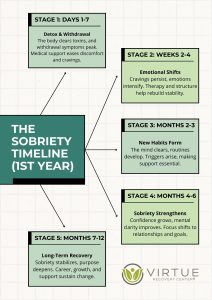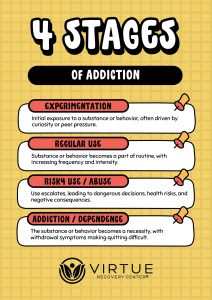Venture into the heart of a casino and you’re met with an electrifying atmosphere: vibrant lights flashing, the distinctive sound of coins against metal, and an air charged with anticipation. This is the realm of gambling, a place where luck and chance reign supreme. Yet, beneath the surface excitement lies a less visible concern: the intricate relationship between gambling and Alcohol Use Disorder (AUD).
Across the United States, the convergence of these two issues forms a complex puzzle. The question isn’t merely why gambling and AUD frequently coexist, but also how the seductive allure of casino culture might be subtly fostering a dual pathway to addiction. This exploration delves into the nuanced dynamics between engaging in gambling activities and the development of AUD, aiming to uncover the underlying factors that entangle individuals in a web of dependency that impacts both personal well-being and the wider community.
Key Takeaways
- Understanding the intricate link between casino culture and the prevalence of Alcohol Use Disorder.
- Exploring the psychological and environmental factors that tie gambling addiction to alcoholism.
- Considering how accessible gambling can inadvertently fuel substance abuse issues.
- Evaluating the ramifications of gambling environments on local and national levels of addictive behaviors.
- Identifying potential strategies and resources for addressing the co-occurrence of gambling and alcohol-related disorders.
Relationship Between Alcoholism and Gambling
The intersection of gambling addiction and Alcohol Use Disorder (AUD) represents a critical area of concern in addiction studies. The simultaneous occurrence of these co-occurring disorders amplifies the difficulties in both diagnosis and addiction treatment, necessitating a synergetic approach that integrates mental health services with targeted interventions for substance abuse. Understanding their intertwined dynamic is paramount to unraveling the layered complexity of dual-addiction afflictions.
The prevalence of co-occurrence highlights the vulnerability of individuals struggling with one of these disorders to develop the other. Emerging evidence suggests that addressing these conditions in isolation may be insufficient, as the overlapping of gambling and AUD can lead to more severe symptoms, higher chances of relapse, and overall poorer prognoses compared to dealing with a singular condition.
Effective management of these co-occurring disorders requires a comprehensive strategy. Below are key elements for a holistic treatment approach:
- Initial assessment to identify the presence of both gambling addiction and alcohol use disorder.
- Development of an individualized treatment plan that addresses the interconnected nature of these disorders.
- Incorporation of evidence-based therapies for addiction and concurrent mental health conditions.
Given the intricate bond between gambling addiction and AUD, it’s clear that recovery is a multifaceted journey. Structured support systems, continuous monitoring, and adaptative treatment modalities are crucial for those wrestling with this duality of addictions. Unraveling the tapestry of psychological and social factors contributing to the sustainment of these disorders can improve treatment outcomes and support long-term recovery goals.
The Alarmingly High Correlation of Pathological Gambling and Alcohol Use Disorders
The intricate dance between pathological gambling and alcohol addiction is not merely a coincidence; it is a cause for deep concern, as recent studies showcase a worrying comorbidity. The intertwining of these behaviors often leads to a vicious circle where gambling exacerbates drinking and vice versa, leaving sufferers ensnared in a co-occurring gambling and alcohol disorder.
Psychological Mechanisms Linking Gambling to Increased Alcohol Consumption
Exploring the psychological underpinnings, it’s evident that the same impulsivity and disinhibition contributing to pathological gambling are influential in driving alcohol addiction. A disruption in these cognitive processes often signifies an underlying brain system dysfunction, which potentiates the risk for comorbid disorders.
| Aspect | Gambling Severity | Alcohol Use Disorder (AUD) |
|---|---|---|
| Prevalence in Treatment-Seekers | High incidence of AUD diagnosis | Common co-occurrence with gambling issues |
| Risk Factors | Increased by alcohol consumption | Exacerbated by gambling behaviors |
| Brain Systems Involved | Impulsivity and reward system dysfunctions | Similar impairments in control mechanisms |
Epidemiology of Gambling Addiction and Alcohol Use Disorder
The substantial emergence of problem gambling and alcohol use disorder as public health crises can be traced back to policy changes, enabling easier access to gambling. This development has brought about a paramount need for effective substance abuse treatment and the expansion of recovery resources. The intersection of these conditions suggests a magnitude and complexity requiring societal and medical acknowledgment and intervention.
With research pointing to a concerning prevalence rate of pathological gambling in adults, the urgency for comprehensive recovery strategies becomes evident. Simultaneously, alcohol use disorder presents itself compellingly within the adult demographic, necessitating widespread support and treatment options.
| Condition | Prevalence in Adults | Implications for Treatment & Recovery |
|---|---|---|
| Problem Gambling | 0.9% – 1.6% | Expansion of tailored substance abuse programs and bolstering of recovery resources to accommodate co-occurring conditions. |
| Alcohol Use Disorder | 7% – 14% |
Source: https://www.ncbi.nlm.nih.gov/pmc/articles/PMC6683819/
Despite these troubling figures, advancements in behavioral health have paved the way for establishing intricate networks of recovery resources and substance abuse treatment facilities. These developments aim not only to treat the symptoms but also to address the underlying behavioral patterns and triggers of problem gambling and alcohol use disorder. It is through such concerted efforts that a reduction in the prevalence of these disorders becomes a foreseeable future outcome.
Strategies including early detection of addictive behaviors, assessment of barriers to treatment, and enhanced public awareness are critical components in tackling the epidemic proportions of these disorders.
Going forward, cross-sectoral collaborations are imperative in refining and disseminating best practices for treatment. This involves tailoring interventions to the unique circumstances of individuals affected by both problem gambling and alcohol use disorder, an approach that champions person-centered care within an evidence-based framework.
The Role of Accessibility: Casinos’ Impact on Local Alcohol Abuse Rates
The increasing proliferation of gambling venues across the nation is not without consequences. As casinos become more accessible, they leave an indelible mark on the communities in which they operate, manifesting in heightened instances of substance abuse and calls for effective gambling help.
The Expansion of Gambling Venues and Its Consequences
The link between the availability of gambling opportunities and rising rates of alcohol abuse is becoming increasingly evident. Areas with higher concentrations of gambling establishments oftentimes report amplified demand for alcohol abuse counseling and substance abuse services, shedding light on the need for community-level interventions and resources to counteract these trends. Gambling help becomes a more pronounced necessity as individuals within these communities face the intensified risk of developing co-occurring gambling and alcohol disorders.
Psychosocial Factors Contributing to the Development of Gambling and Alcohol Use Disorder
The complex interplay between individual psychology, social environments, and economic circumstances forms a web of factors that contribute to the development of Gambling and Alcohol Use Disorder. Among these, the casual yet potent amalgamation of gambling and alcohol consumption within casino settings plays a pivotal role. Let’s explore how these intertwined social practices and socio-economic conditions influence the propensity for addiction.
The Entwined Nature of Social Interactions in Casinos and Drinking
In the vibrant ambiance of casinos, alcohol flows as liberally as the promise of fortune, creating a seductive blend that can often lead to the exacerbation of gambling and drinking behaviors. Within these precincts, where the thrill of risk meets the disinhibition produced by alcohol, players find themselves in a social trap that more easily facilitates the slide into addictive patterns. Treatment options must therefore be crafted considering this enmeshing of activities, ensuring that those in need of gambling and alcohol rehabilitation receive targeted interventions.
The Role of Socio-Economic Status in Susceptibility to Addiction
Research has established a stark connection between socio-economic status and increased vulnerability to addiction. Lower socio-economic groups are often more exposed to stressors and have limited resources for coping strategies, thereby inflating their risk of developing Gambling and Alcohol Use Disorder. Conversely, those of higher socio-economic status may have better access to rehabilitation and preventative resources, suggesting a need for nuanced treatment approaches that take into account these economic disparities.
| Treatment Approach | Focus on Gambling | Focus on Alcohol Rehabilitation | Socio-Economic Consideration |
|---|---|---|---|
| Integrated Therapy | Behavioral Interventions | Detoxification Programs | Sliding Scale Fees |
| Community Support | Peer Support Groups | Alcoholics Anonymous | Accessible Local Services |
| Preventative Education | Risk Awareness Seminars | Safe Drinking Practices | Outreach Programs |
| Crisis Management | Emergency Intervention | Withdrawal Management | Low-Cost Clinics |
Treatment: Navigating the Rocky Road to Recovery
The journey towards overcoming addiction is often a complex path fraught with challenges. The integration of gambling and alcohol rehabilitation into a singular regime is pivotal in ensuring a successful transition from dependency to sobriety. Recognizing the need for specialized addiction treatment that caters to the dual nature of these disorders is the cornerstone of effective recovery programs.
Combining Substance Abuse and Gambling Addiction Treatments
Merging treatments for those battling both gambling and alcohol addiction is not merely a suggestion—it is a necessity. Tailored gambling and alcohol help initiatives must couple the psychological intricacies of addiction with behavioral interventions and support systems. This approach holistically addresses the intertwined complexities of these coexistent conditions.
Preventive Interventions and Policy Responses to Casino Culture
Addressing the adverse effects of casino culture on communities involves a proactive approach that includes preventive interventions and robust policy frameworks. At the heart of these initiatives is the goal to minimize the risk factors associated with gambling addiction and equip individuals with the tools necessary for recovery.
Legislation and Governmental Control for Casino Operations
In response to the growing concern surrounding gambling addiction, legislative bodies are increasingly imposing stricter controls on casino operations. These measures are integral to the agenda of providing legislative control aimed at reducing the incidence of problem gambling. Effective regulation not only curtails the proliferation of gambling opportunities but also ensures that responsible gambling practices are upheld within these establishments.
Community outreach programs, augmented by focused counseling, are essential for creating awareness around the risks of gambling addiction. Governmental agencies and non-profit organizations collaborate to orchestrate campaigns designed to educate the public about the harms associated with excessive gambling and to promote healthy participation in gambling activities.
Innovative Paths to Rehabilitation: Coping Strategies and Support Groups
Embarking on the journey to recover from gambling and alcohol use disorders requires a multifaceted approach, rich in diverse treatment options. At the heart of this transformative path are robust coping strategies tailored to meet individuals’ unique challenges and resilient support groups that foster communal healing and growth. The exchange of experiences and the shared wisdom within these groups serve as a cornerstone of effective counseling sessions, pushing the boundaries of traditional recovery models.
As we delve into the realm of coping strategies, we uncover techniques that are designed not only to help sufferers abstain from addictive behaviors but also to improve their overall quality of life. From cognitive-behavioral therapy to mindfulness and stress management, these strategies equip those in recovery with the tools to navigate everyday obstacles and maintain long-term sobriety and mental well-being.
| Coping Strategy | Purpose | Benefits |
|---|---|---|
| Mindfulness and Meditation | To enhance present-moment awareness and reduce cravings | Improves focus, reduces stress, and fosters emotional balance |
| Cognitive-Behavioral Therapy (CBT) | To identify and modify negative thought patterns | Enhances personal coping skills, improves adherence to treatment |
| Relapse Prevention Education | To understand and prevent the circumstances that lead to relapse | Empowers individuals to handle triggers and high-risk situations |
| Exercise and Physical Activity | To improve physical health and alleviate mood | Promotes endorphin release, aids in managing anxiety and depression |
Moving forward, support groups such as Alcoholics Anonymous (AA) or Gamblers Anonymous (GA) provide indispensable communal counseling platforms where stories are shared, and unconditional encouragement is exchanged. The solidarity found within these groups confirms that no one is alone in their struggle, thereby enhancing motivation and fostering hope.
- Alcoholics Anonymous (AA): A fellowship where members share their experience, strength, and hope with each other.
- Gamblers Anonymous (GA): A community rooted in a shared desire to stop gambling and to assist others with the same ambition.
- Online Support Forums: Virtual spaces that offer flexibility and anonymity for those seeking support.
- Therapy Groups: Facilitated by mental health professionals, these groups focus on skill development and therapeutic sharing.
In conclusion, the dedication to adopting new coping strategies and engaging with support groups can significantly enhance the recovery process from gambling and alcohol use disorders. These innovative paths to rehabilitation symbolize a new chapter in the lives of individuals determined to reclaim their autonomy over addiction.
Impact of Casino Culture on Public Health and Local Communities
The infusion of casino culture into societal norms has become a palpable force, shaping the contours of public health dialogues and communal fabrics with broad strokes. As families navigate the shimmering allure of gaming establishments, the ripple effects of problem gambling and alcohol abuse perch precariously on the balance sheets of both personal finances and public health initiatives. Encountering these challenges, communities grapple with the task of cultivating resilience and fostering environments where the risk is met with robust support and counseling structures.
Financial Implications for Families and the Community
Problem gambling does not exist in a vacuum; its tentacles stretch into the sanctity of households, grasping the economic stability of families. The lure of potential wins is frequently shadowed by the grim reality of financial losses, leading to strained relationships, mental health issues, and unfortunately, an uptick in substance abuse as a coping mechanism. The following table encapsulates the financial implications that problem gambling can impose on individuals and the broader community:
| Aspect | Impact on Families | Impact on Local Communities |
|---|---|---|
| Personal Debt | Increased borrowing, risking credit scores and home foreclosures | Rising demand for financial support services and debt counseling |
| Employment | Job loss due to decreased productivity and absence | Higher unemployment rates affecting local economy |
| Crime Rates | Heightened risk of engaging in illegal activities for fund acquisition | Additional strain on law enforcement and legal systems |
| Health Care | Growing need for mental health and substance abuse treatment | Increase in public health expenditures and resource allocation |
Public Health Initiatives and Their Role in Mitigating Harm
In response to the burgeoning concerns around problem gambling and its interplay with alcohol abuse, public health initiatives have been pivotal in curtailing the spread and depth of the issue. These programs, rooted in principles of early intervention and community engagement, concentrate efforts on alcohol abuse counseling, encouraging responsible gambling, and drafting policies that aim to shield the public from the clutches of compulsive gambling behaviors.
- Alcohol Abuse Counseling: Offering a nexus of support, counselors are trained to address the co-occurring nature of problem gambling and alcohol misuse, affording tools for individuals to navigate the complexities of recovery.
- Responsible Gambling Practices: Public awareness campaigns and education sessions underscore the imperative of playing within limits and recognizing the signs of addiction.
- Community Resilience: Building resilient communities through local support networks, where experiences are shared and resources, such as self-help groups, are accessible, creates a buffer against addiction proliferation.
Centering these measures is not only the humane course but one that staunchly defends the infrastructure of public health against an escalating incursion.
Get Help for Alcoholism
If you or someone you know is struggling with Alcohol Use Disorder (AUD) alongside gambling addiction, it’s crucial to seek professional help. Virtue Recovery Center in Las Vegas offers comprehensive support and treatment for individuals facing the challenges of alcoholism and gambling addiction. Their experienced team provides a holistic approach to recovery, focusing on both the psychological and physical aspects of addiction.
Alcohol and Gambling Addiction
The intersection of alcohol and gambling addiction presents unique challenges. These dual addictions can feed into each other, creating a cycle that’s hard to break without professional intervention. Virtue Recovery Las Vegas understands the complexities of treating co-occurring disorders and offers specialized programs designed to address the root causes of both gambling and alcohol use disorder. With a focus on personalized care, patients can find the support they need to embark on a journey toward recovery and regain control of their lives.
Substance Abuse Treatment
It’s important to address the broader spectrum of substance abuse treatment available. Substance abuse, whether involving alcohol, drugs, or both, requires a comprehensive approach to treatment that goes beyond addressing the symptoms to uncover and heal the underlying causes of addiction.
Virtue Recovery Center in Las Vegas extends its expertise to encompass a wide range of substance abuse disorders, providing a supportive and healing environment for individuals seeking freedom from addiction. Their programs are tailored to meet the unique needs of each person, incorporating evidence-based therapies, support groups, and holistic treatments designed to promote long-term recovery.
The journey to overcoming substance abuse is a personal one, and Virtue Recovery Center is committed to guiding individuals every step of the way. By fostering an atmosphere of compassion, understanding, and respect, they empower their clients to achieve lasting change and a renewed sense of hope for the future.
For more information or to seek help, contact Virtue Recovery Center Las Vegas. Remember, taking the first step toward recovery is a sign of strength, and help is available.
Conclusion
The relationship between casino culture and the rise in gambling and alcohol use disorder is more than a footnote in public health discourse; it’s a pressing reality that demands our earnest attention and action. As this article has explored, the fabric of these pursuits is interwoven tightly, with each thread reinforcing the other. Our communities are in need of robust recovery resources that not only act as a safety net but also as proactive agents in preventing the onset of these co-occurring disorders. As we have seen, the role that rehab centers play is not just curative but educational, empowering individuals with the knowledge and tools to navigate the complexities of these conditions.
The call for enhanced recovery support systems is loud and clear. It is critical to foster an environment where individuals grappling with gambling and alcohol use disorder can find solace and strength. By ensuring that our rehabilitation programs are integrated and comprehensive, we affirm our commitment to tackling the multifaceted nature of these issues head-on. Prevention, as we’ve learned, is equally as important as treatment—a harmonious blend that holds the promise of healthier individuals and, by extension, healthier communities.
Looking ahead, it’s evident that our efforts must be synchronized and continual. Tapping into community involvement, utilizing preventive measures, and embracing integrated treatment strategies will be paramount in addressing the challenges posed by gambling and alcohol use disorder. The journey may be arduous, but it is one we must undertake with resolve and unity, bearing the goal of meaningful change and sustainable recovery not merely as a vision but an achievable reality.
FAQ
1. What is the relationship between alcohol use and gambling addiction?
Alcohol use and gambling addiction often co-occur because both behaviors share common risk factors and neurobiological features. Excessive alcohol consumption can impair judgment and decision-making abilities, leading to increased gambling behavior. Additionally, alcohol and gambling environments often overlap, leading to a higher rate of pathological gambling among individuals with alcohol use disorder.
2. What is substance use disorder and how it relates to alcoholism and gambling addiction?
Substance use disorder is a medical condition characterized by the problematic use of a substance (like alcohol) causing significant impairment. It can lead to alcoholism if the substance misused is alcohol. Additionally, due to shared underlying neurobiological mechanisms, individuals who suffer from substance use disorder may also display disordered gambling behavior leading to gambling addiction.
3. How can one identify problem gambling?
Problem gambling can be identified by an obsession with betting, placing larger bets to experience the same thrill, unsuccessfully trying to control, cut back or stop gambling, and gambling despite serious consequences or harm. To determine if one falls into dsm-iv pathological gambling, professional help should be sought.
4. What are the effects of alcohol abuse on one’s health and lifestyle?
Alcohol abuse, along with alcohol dependence – collectively known as alcohol use disorder – can have severe impact on one’s health and lifestyle. This includes liver diseases, heart problems, risk for psychiatric disorders, and social issues such as unemployment or broken relationships. Getting addiction treatment is crucial to prevent these problems.
5. How does drinking and gambling affect one’s financial health?
Excessive drinking and gambling often leads to financial instability. Uncontrolled spending on alcohol and consistent losses from gambling can lead to significant financial problems, from debts to bankruptcy. On top of this, alcohol and gambling addiction can negatively impact work performance, often leading to job













